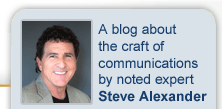I was recently asked to attend and facilitate a small planning meeting. Before we got started, one of the attendees asked the question, “Why am I here?”I could tell it was not about the meaning of life nor was it rhetorical! It actually startled everyone, and I realized immediately not everyone was on the same page as the person who ‘called’ the meeting (in our business that’s commonly referred to as the ‘convener’).
Meetings are one of the biggest issues I hear folks in my world talk about, question and criticize. In fact, the word ‘meeting’ and the phrase ‘waste of time’ are often either synonymous or at least heard in the same sentence. Rarely do people seek my services because they have such great meetings and just want to make them even better. Usually, as part of the executive coaching, team-building process and overall improvement program, they want to know how to make their meetings work.
The question was one of the most direct ways I’d heard of asking that series of questions we should all ask when we’re planning to attend or, if it can’t be done prior, actually attending a meeting. Why am I here? What value do I add? What value will this meeting add to my work, what I need to produce for the company, how I support my peers, satisfy my customers, enhance my skills, etc.? Is this a meeting I need to be in face-to-face? Can the results be achieved in some other manner that’s less costly and time-consuming and more effective? What’s expected as a result of my attendance? What will I do differently, more of/less of, as a result of this meeting? You ever ask yourself these questions? Out loud? In front of your peers? Try it.
It’s the convener’s job (remember, that’s the person who calls the meeting) to be crystal clear about the meeting purpose: what key outcome(s) need to be achieved that warrant(s) those in attendance being there to achieve that purpose. The second job of the convener is to select the right participants. Who is, and why are they, necessary to achieve that purpose? This isn’t determined by title or even the job they hold in the organization. It’s more important to consider what ‘value add’ each participant will have to achieving that meeting purpose. Another key question for the convener is what exactly do we need to accomplish in the meeting, and how should the meeting be structured to accomplish that, in order to fulfill the meeting purpose? Finally, ask what materials and information participants need to have in advance and/or at the meeting to wisely use their time and produce the outcome. (This is guided by the proviso that a meeting should never be used to ‘read’ information to participants!)
If you’re a convener, don’t call your next meeting without answering these questions. If you’re a meeting participant, don’t be afraid to startle your colleagues and the convener with this critical question, “Why am I here?” If you want to be part of effective, high-energy, high-impact meetings, apply this simple question and encourage a business culture that supports it. Your company, co-workers, customers and you deserve it!
Tags: Board Development, boards, CEOs, change, chief executives, Coaching, effective decision making, executive directors, Facilitation, groups, Leadership Development, meeting management, organizational development, presidents, self development, Team Building, time management, workplace




